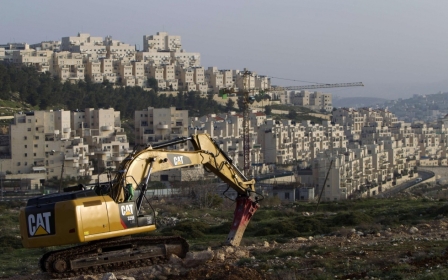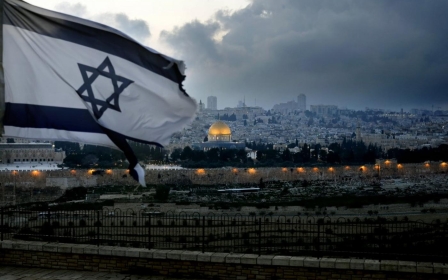Israeli press review: Israel more keen on colonisation than alleviating poverty

Illegal settlements get more cash than poor towns
A new report has revealed that the Israeli government is far more interested in developing urban centres in occupied lands than it is in raising the living standards of communities in its own country.
The Adva Center for social justice in Tel Aviv revealed that budget allocation for illegal settlements in the occupied West Bank outweighs communities in Israel that suffer from socioeconomic problems.
Though the Adva Center’s reports usually receive ample media coverage, its latest was picked up by no major newspaper or television channel - despite it being released a month before parliamentary elections.
Many of the incumbent Likud party’s voters live in “developing towns” - commonly Israeli towns mostly populated by Mizrahi Jews (Jews originating from Arab or Muslim countries) with high levels of poverty and unemployment.
New MEE newsletter: Jerusalem Dispatch
Sign up to get the latest insights and analysis on Israel-Palestine, alongside Turkey Unpacked and other MEE newsletters
The Adva Center argues that both the “developing towns” and the illegal settlements built in the West Bank are aspects of the settlement policy of the Zionist movement and the Israeli government, and that the population in both tends to vote for right-wing parties in larger proportion than the average population.
However, the report also shows that the standard of living in West Bank settlements is significantly higher than in developing towns. The wealthiest settlements were those with most hardline Zionist populations more strongly associated with the Israeli far right, the report says.
A large part of the government investment in the West Bank settlements, however, comes in the form of security installations and military patrols, which do not contribute to the standard of living of the residents.
Far-right politicians disqualified
Two far-right Israeli politicians have been banned from running in the 17 September elections by the High Court, but their Jewish supremacist party may still participate.
The court reached the decision on Baruch Marzel and Benzi Gopstein unanimously, ruling that their comments inciting racism were a violation of Israeli basic law.
Marzel responded to the court’s decision saying: “In the next life the court’s judges will be ash at the feet of Gopstein.” For his part, Gopstein said: “The High Court proves again that it is a branch of the [left-wing party] Meretz.”
In the late 1980s, the far-right Kach party under the leadership of Rabbi Meir Kahane was disqualified from participating in the elections for the Knesset, because Kahane called for expelling Palestinians from Israel and considering all Arabs as enemies.
Marzel and Gopstein’s party, Jewish Power, is populated by several politicians who identify as Kahanists, such as Michael Ben-Ari and Itamar Ben-Gvir.
Famous journalist goes on racist rant
Yaron London may be among Israel’s most prominent television journalists and news anchors, with nearly 50 years' experience, but the past year has seen him mired three times in scandal over controversial statements.
The most recent scandal erupted this week during a debate with left-wing journalist Gideon Levy over the new television mini-series Our Boys on the events that led to the 2014 Gaza war.
Responding to the deaths of three settlers in the West Bank, part of a series of escalations that saw deaths on both sides, the 79-year-old said “the Arabs are savages” and added “they don’t just hate Jews, they murder themselves first and foremost”.
Kan 11, the channel on which London’s show “London and Geula” airs, distanced itself from the statement, and the journalist published an apology shortly thereafter.
Last week, London quoted a conversation with the entertainer Dudu Topaz who died in 2009, in which the two spoke about the insatiable male desire for sexual conquests.
London quoted himself as telling Topaz “you are actually looking for the galactic pussy” and was immediately silenced by his co-host Geula Even.
In June, London admitted that he grabbed the breast of a woman in an elevator after she touched his belly without permission. Despite the outcry over that statement, London refused to apologise.
Israeli scholar Tom Mehager has argued that London is a symbol for Ashkenazi (European Jewry) hegemony in Israel, and says he has frequently adopted a condescending and patronising discourse when speaking with Mizrahi Jews and Palestinians.
Politician stumbles into Ashkenazi-Mizrahi row
Israel’s Ashkenazi-Mizrahi divide was exposed on Galatz military radio recently, when Ram Ben-Barak of the Blue and White party described the difference between his camp and those to the right as: “We are white, they are black.”
The statement received fierce condemnation from right-wing politicians and the media.
Ben-Barak’s comment was interpreted as referring to Ashkenazi and Mizrahi Jews, and was compared with artist Yair Garbuz's notorious 2015 statement, saying Mizrahi “are kissers of amulets”, which helped the Likud win the elections that year.
Much of Likud’s voter base is made up of Mizrahi Jews, who come from Middle Eastern origins.
Likud members were quick to issue responses to Ben-Barak’s comment, presenting Blue and White as a racist party.
Journalist Guy Zohar noted in April that Garbuz’s statement was important for the right’s victory, because Garbuz was perceived as representing a smug Israeli elite.
The two journalists who interviewed Ben-Barak, Rino Tzror and Razi Barkai, apologised for the incident, arguing that the statement was taken completely out of context from a longer segment.
* Israeli press review is a digest of reports that are not independently verified as accurate by Middle East Eye.
Middle East Eye delivers independent and unrivalled coverage and analysis of the Middle East, North Africa and beyond. To learn more about republishing this content and the associated fees, please fill out this form. More about MEE can be found here.




